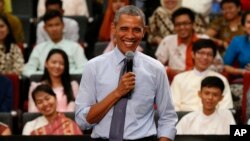President Barack Obama urged young people in predominantly Muslim Malaysia on Friday to reject the "terrible vision" that drove the Paris attacks, offering an alternative vision in which traditional cultures coexist with a diverse modern world.
"You can set an example," Obama told college-age youngsters in Kuala Lumpur. "Not just to stand up to violent extremism, but to build interfaith dialogue, to promote tolerance."
At a town hall meeting at an American-style university, Obama called on the next generation to avoid a mindset in which people divide themselves along ethnic, racial or tribal lines, calling it a precursor to discrimination. He said the next step in that thought process is to demonize those who are different, and that line of thinking is wreaking havoc and violence across the Middle East.
"Those countries are in chaos — so many of them — because of this notion that somehow, if somebody worships God differently than you, that they're less than you," Obama said. "And people are slaughtered based on that idea."
Obama's plea to young people came one week after Islamic militants killed 129 and wounded hundreds more in Paris. In a fresh reminder of the extremist threat, as Obama was holding his town hall, gunmen were attacking a hotel in Mali, where they took about 170 hostages and shouted "God is great" in Arabic.
Obama's national security adviser, Susan Rice, briefed him on the violence just after he left the stage, the White House said.
Obama sought to expose the ideology he said leads to such violence as he spoke to some 500 participants of his Young Southeast Asian Leaders Initiative, part of Obama's broader effort to expand U.S. ties to the Asia-Pacific region.
The president's visit to Taylor's University was his first stop after arriving in Kuala Lumpur, the last leg of his 9-day trip to Malaysia, the Philippines and Turkey. He was greeted by repeated cheers by an enthusiastic crowd of young men in traditional songkok caps and women whose brightly colored hijabs created a sea of red, pink, purple, green and blue.
Noting his personal connection to the region, Obama said Asia-Pacific is "part of who I am and how I see the world." The president lived in Indonesia as a child and his half-sister was born there.
Obama also planned to meet Friday with Malaysian Prime Minister Najib Razak, who is embroiled in a scandal over allegations of corruption related to a debt-ridden state investment fund. At issue is $700 million that ended up in Najib's personal bank accounts, allegedly from the fund.
Ahead of the visit, Obama faced criticism for being too chummy with the embattled prime minister, whom rights groups have also accused of human rights abuses and a crackdown on press freedoms. During his annual Hawaii vacation last year, Obama played a round of golf with Najib, who was also vacationing there.
Ben Rhodes, deputy national security adviser at the White House, said Obama would raise U.S. concerns about the imprisonment of political dissidents and other human rights issues "very directly" during his meeting with Najib.
"We'll make clear our deep concern about recent steps that have been taken to marginalize the opposition," he said.
Asked about the issue during the town hall, Obama didn't mention Najib by name, but he reiterated his intention to raise such issues with Malaysia's government while in the country. Still, Obama emphasized that the U.S. must do business and work closely even with countries whose records are far from perfect.
"The United States has to have some humility, because there have been times when we did the wrong thing," Obama said.
A major dose of humility arrived minutes later when one spry young man told the gray-haired president he was "aging toward a very senior life." Although Obama said it hurt his feelings, he took it in stride. He laughed it off as he directed the questioner to finish his question and sit down.
"The first thing I want from young people is to stop calling me old," Obama said.




